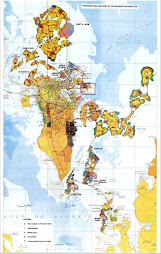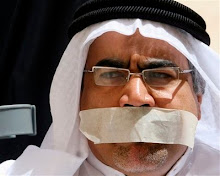Pressure to end wealth disparity between Bahrain's Shias and Sunnis
http://www.meed.com/bahrain/specialreport/2008/01/pressure_to_reform_builds.html?emailafriend=880239466
Published: 25 January 2008 12:03 GMT
Author: Victoria Robson
More by this Author
Last Updated: 27 January 2008 07:43
A cold wind blows across the sea and buffets the awnings of a construction site along King Faisal highway. Few Manama residents are outside as the temperature drops to 13oC. The city is quiet again following the clamour and congestion that accompanied US President George Bush's one-day visit to the kingdom on 12 January.
The scene is also a marked contrast to the anti-government demonstrations in mid-December, which culminated in the death of a young man who, according to activists, was asphyxiated by the tear gas used to tame rioters, or, according to the government, died of natural causes.
The protests were a repeat of previous confrontations between demonstrators drawn from the kingdom's majority Shia population and the security forces.
The riots have caused resentment in the kingdom, which is ruled by the Sunni Al-Khalifa family, and the government response has been to crack down on activist activity. The protests that ran for three days were followed by a round of detentions and at least 18 people remain in custody.
"A month ago we were calling for a blood drive. Now we are calling for the dismissal of the prime minister"Bduljalil Alsingace, director of media and international relations Al-Haq
Violent demonstrations
The pretext for the demonstration on 17 December, the day after National Day, was to commemorate people killed in the demonstrations of 1994 and to protest against human rights abuses.
"It was inevitable that the interior ministry would not issue a licence to permit a march on that day," says one Western diplomat. "The demonstrators picked about as a provocative a day as they could, and the ministry knew there would be trouble."
The mood turned violent when security for-ces tried to dispel demonstrators. A police car was set alight and a police machine gun stolen.
But anti-government activity did not end there. On 28 December, the Al-Haq Movement of Liberties & Democracy, a group viewed as at the extreme end of the political spectrum, launched a petition calling for the dismissal of Prime Minister Sheikh Khalifa bin Sulman al-Khalifa. Sheikh Khalifa has held the post for 37 years.
"A month ago we were calling for a blood drive," says Abduljalil Alsingace, director of media and international relations for Al-Haq. "Now we are calling for the dismissal of the prime minister."
Al-Haq presents itself as a non-sectarian movement that is pursuing a campaign of civil disobedience in its push for democratic reform. It rejects the Shia label put on it, as well as Bahrain's current constitution, and will boycott the National Assembly elections due in 2010. It is an unregistered group aligned with the banned Bahrain Centre for Human Rights, the website of which is blocked in the kingdom.
Despite its avowed commitment to peaceful activities, gatherings orchestrated by Al-Haq attract a core of disaffected, unemployed, young, male, Shia participants eager to anta-gonise the government.
The Sunni-Shia tensions at the root of the demonstrations are more economic than religious. They are driven by a disparity of wealth and opportunity between the two communities.
Even taking into account the wealthy Shia business families such as the Koohejis, many members of the Shia population, who account for up to two thirds of the Bahraini national population, feel excluded from jobs, both in government and the private sector, and the spoils of the oil wealth.
"The issue is not the monarchy, it is corruption"Mansoor al-Jamri, editor in chief of local newspaper Al-Wasat
Split community
Segments of the community live in poverty despite healthy economic growth. Community representatives demand housing, an end to the misappropriation of land, improved infrastructure, including wastewater facilities, and caps on the rising cost of living.
The frustrations are exacerbated by the long-held conviction that the government is seeking to redress the sectarian imbalance to bolster its position by importing conservative Sunnis from Iraq, Syria and Yemen. The government is alleged to give these immigrants jobs and housing, a charge it denies.
"The rioters operate in a pool of wider discontent about the economic situation," says the diplomat. "The government knows this. If it could drain that pool, the demonstrators on the street would disappear. A vast majority of the Shia community do not like the violence."
Alsingace is part of a network of established political activists who promote a raft of popular committees that campaign on issues from unemployment to statelessness and income tax. His brother was still being held in detention as MEED went to press.
Both his sister and mother were arrested and detained for spells in the uprisings of the 1990s. Their detentions were connected with the arrest of Alsingace's younger brother, who now lives in the Netherlands, where he was granted political asylum.
Despite its extremist profile and the characterisation of some of its tactics by other groups opposing the government as self-defeating, Al-Haq's agenda includes two platforms common to opposition movements in the kingdom: an end to sectarian discrimination and a fairer distribution of wealth.
"The Shia community are not treated as normal citizens with normal rights, bearing in mind the majority of them represent the indigenous community," says Mansoor al-Jamri, editor in chief of local newspaper Al-Wasat.
With wealth inequality comes the feeling among Shia groups that they are politically disenfranchised. The National Assembly was established after a round of elections in 2002 during a period of reform and democratic hope, when political dissidents were pardoned and allowed to return to Bahrain. For some, it has been a disappointment.
The assembly, which had a second round of elections in 2006, has no powers to legislate. The upper chamber, the Majlis al-Shura (parliament), is appointed by the king and the second
chamber of 40 elected deputies has little influence or power.
Representatives of the Shia community maintain that the constituency structure has been altered so there are a disproportionate number of government-aligned Sunni candidates representing small districts. This dilutes the Shia vote. The assembly has probed corporate scandals but the scrutiny powers over ministers are weak.
The main Shia opposition group, Al-Wefaq National Islamic Society, has been unable to introduce any measures for the betterment of its constituents and is in danger of losing critical support to more radical groups, such as Al-Haq.
On 15 January, the assembly voted down Al-Wefaq's proposal for an investigation into discrimination in the kingdom. "The government has been using its parliamentary bloc to block everything," says Al-Jamri. "It is fuelling the situation by not giving anything to Al-Wefaq."
Many Bahrainis condemn the assembly as a powerless talking shop. However, as a forum for debate, it is a public arena where delegates can air their constituents' grievances, and a means by which the government can assess the popular mood.
"The ruling family is sensitive to public opinion and the upper chamber is a reflection of that," says the diplomat.
"The fact that we have a parliament that can raise questions in the open is a plus, even if it is blocked," says Al-Jamri. "Parliamentarians are able to speak their minds, and in a small country that makes a big impact. What we are able to say now would have put us in jail in the past."
Despite concern that the oil wealth has been appropriated by a few at the expense of the Shia community, anti-monarchy sentiment in Bahrain is not fervent. "The Shia community accepts the Al-Khalifas," says the diplomat. "They accept that any constitutional change will be within an Al-Khalifa monarchy."
Even Al-Haq calls for what it sees as "true constitutional monarchy", not its removal. It seeks the removal of all members of the ruling family from government, in line with a popular Shia sentiment that objects to Al-Khalifa dominance of ministerial jobs.
"The issue is not the monarchy, it is corruption," says Al-Jamri.
Power shift
As prime minister, Sheikh Khalifa is at the centre of power. But the king's son, Crown Prince Sheikh Salman bin Hamad al-Khalifa, who stands at the third corner of the tripartite power structure, is rising as a political force as the ageing prime minister withdraws from the day-to-day running of government.
Crown Prince Sheikh Salman is now officially in charge of two policy pillars: defence and the economy. He is also head of the Economic Development Board and leads the country's reform agenda.
Local observers point to a range of opinion within the Al-Khalifa family, from political conservatism that espouses family rule, to those in favour of an elected parliament and press freedom. The king and the crown prince are considered to be at the liberal end of the spectrum.
It was a surprise to many in mid-January when, in a letter to his father, the crown prince publicly criticised elements of the government for holding up economic reforms. He complained that the lack of co-ordination and policy clashes within government were delaying the economic programme.
His comments were widely reported in the local press and construed as a public criticism of the prime minister. The move was seen as part of a slow accumulation of power by the crown prince, who is viewed as an intellectual and a force for change. Unlike elsewhere in the Gulf, Bahrain's system of primogeniture means it is clear that Crown Prince Sheikh Salman will take over.
Despite the government's interest in maintaining the status quo, change is happening. The reforms that accompanied the king's accession in 1999 have set in place an expec-tation of democratic progress. Introducing reforms is understood to be the king's attempt to craft his own legacy.
Bahraini society is increasingly influenced by the international community. The government is likely to be more mindful of its human rights record in the coming year as it is subject to a UN human rights investigation.
Al-Jamri returned to Bahrain in 2001 fol-lowing more than 20 years in exile in the UK, where he
acted as an opposition spokesman. Al-Wasat has revealed several government scandals, including plans to sell off reef islands to the north.
That he can sit in his office, discuss the poli-tical situation and report on it is something the government must continue to allow if it wishes to present a modern image of the kingdom. This image is also crucial to its aspirations to become a cosmopolitan regional centre of finance.
Key challenge:
Addressing social imbalance when economic reform is being blocked by government officials
Author: Victoria Robson. Gulf Correspondent
Dubai
skip to main |
skip to sidebar

خارطة البحرين الجديدة
Facebook Badge
Followers
فسيلة السنكيس
متى ما ظهرت الفسيلة - الصغير من النخل- من فوق سطح الأرض، فمن حقها أن تنمو وان تعانق السماء دون حصار أو مضايقة أو استهداف
حق الفسيلة في الحياة كحق غيرها، من المخلوقات، خاصة وإن كانت دليل أصالة شعب كشعب البحرين
--------------------------------------------------------------
صاحب المدونة: د.عبدالجليل السنكيس
ناشط، كاتب وباحث أكاديمي من البحرين
البريد الإلكتروني: asingace@gmail.com
مدونة اخرى: http://alsingace.katib.org/
هاتف:8179-3966-973+
حق الفسيلة في الحياة كحق غيرها، من المخلوقات، خاصة وإن كانت دليل أصالة شعب كشعب البحرين
--------------------------------------------------------------
صاحب المدونة: د.عبدالجليل السنكيس
ناشط، كاتب وباحث أكاديمي من البحرين
البريد الإلكتروني: asingace@gmail.com
مدونة اخرى: http://alsingace.katib.org/
هاتف:8179-3966-973+
مواقع ووصلات ذات صلة Links of Interest
صور معبرة

خارطة البحرين الجديدة






